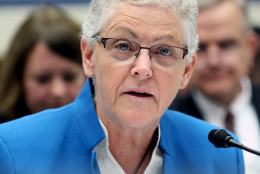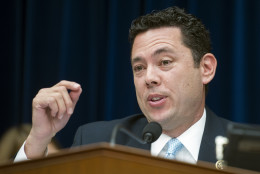Tom Temin
-
While you can make some comparisons, The F-35-as-Edsel is an imperfect analogy. And not a particularly useful one.
February 16, 2016 -
When both the House and Senate appropriations committee chairmen decided to not hold hearings on the President's 2017 budget request, you knew the year was off to a rough start. Now a battle royale is looking in the possible nomination of a new Supreme Court justice. For how this all might play out, Federal Drive with Tom Temin talks to David Hawkings, senior editor of CQ Roll Call.
February 16, 2016 -
Members of the House Agriculture Committee heavily questioned McCarthy at a hearing to find out why the EPA was not more active after it was discovered that Flint's water supply had been tainted.
February 16, 2016 -
My first thought on seeing the news on my smartphone with near-simultaneous alerts from four major news organizations: Oh, here comes another ugly battle in Washington.
February 15, 2016 -
President Barack Obama's Fiscal Year 2017 budget proposal gives the Defense Department $524 billion, plus another $59 billion for overseas contingency operations.
February 15, 2016 -
For first responders to natural disasters, information is their most important commodity. Data about local infrastructure, sources of supply, roads and terrain. Sometimes that data can be hard to find, yet much of it exists. The National Geospatial Intelligence Agency maps nearly every square foot of the globe. Senior Analyst Nat Wolpert tells Federal Drive with Tom Temin how the NGA comes through with information when disaster occurs.
February 15, 2016 -
The Defense Department is working on new training programs to teach senior officers and troops about the Pentagon's new blended retirement system.
February 15, 2016 -
As OMB presses agencies to spend more money on new or modernized systems, some federal CIOs and other IT executives say modernizing the definition of legacy systems is an important starting point.
February 15, 2016 -
VA Secretary Bob McDonald and Deputy Secretary Sloan Gibson are working with Congress on a proposal that would strip senior agency executives of their rights to appeal to the Merit Systems Protection Board when they face disciplinary action. But the proposal faces growing criticism from the Senior Executives Association and others.
February 12, 2016 -
I have evidence TSA and its contractors are committed to continuous improvement.
February 12, 2016 -
It may be another 9 months until the football season returns, but federal managers have another team sport they can play in the meantime. It's called innovation. Yes, innovation is not a contact but a contract sport at least according to the Partnership for Public Service. Ron Sanders, principal author of the new study on how agencies can team up with industry and academia, joins Federal Drive with Tom Temin to share how you can play without getting hurt.
February 12, 2016 -
NASA's Mars Rover Opportunity recently complete its 12th year on Mars. Its mission was originally meant to last just 90 days. Since then, the gadget has taken more than 200,000 images and driven more than 26 miles across the surface of the red planet. Just how did it work out so much better than NASA could have hoped for? Federal News Radio's Eric White spoke with John Callas, the Project Manager for the Mars Exploration Rover Project at the Jet Propulsion Laboratory. He shared that interview on Federal Drive with Tom Temin.
February 12, 2016 -
The National Security Cutter is at the heart of a long-running effort to modernize the Coast Guard. Three of the ships have already been built and deployed. The Coast Guard, with test and evaluation help from the Navy, says the ships are effective and suitable for its mission. The Government Accountability Office is saying, not so fast. Michele Mackin, director of acquisition and sourcing management issues at GAO, fills in all the details on Federal Drive with Tom Temin.
February 12, 2016 -
The discovery demonstrates the ability of government to advance basic research by committing grants to responsible people.
February 12, 2016 -
Rep. Jason Chaffetz (R-Utah) is now asking the GAO to review how well agencies are conducting risk assessments and whether security is getting better because of the standards.
February 12, 2016













